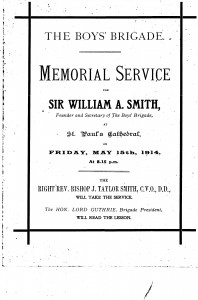
Front cover of the order of service for the memorial of W. A. Smith. Reproduced by kind permission of the 3rd Enfield Company of the Boys’ Brigade
On 10 May 1914 William Alexander Smith – the founder of the Boys’ Brigade – passed away after being taken ill at the meeting of the Executive Committee of the organisation in London.[2] Smith had said to his son Stanley that to see St. Paul’s full with boys would be an impressive sight.[3] The location was to be crowded with young men, when 4,000 attended his memorial tribute on 15 May 1914.[4] The scale of mourning shown on his passing was a long way from the life of young ‘Willie’, born on the northern coastline of Scotland – the setting where his love for ships and the sea began.
Smith’s biographer noted that a shipwrecked crew finding shelter in Pennyland – his childhood home not far from the small fishing port of Thurso – was “one of the lads’ earliest recollections”.[5] From this early age leisure on the water became a source of great pleasure for William. From his youth onwards he was considered to be an “experienced yachtsman, and a rowing-boat to him was as safe as his bed”.[6] In his formative years he spent a summer with F. P. R. Ferguson – who would become a President of the Glasgow Battalion– where the two enjoyed a season of yachting and their bonds of friendship grew.[7] The water was also a place where the he was able to take stock with his family. His wife is said to have loved the water and the hills and he taught his boys to share the delights of swimming, rowing and sailing”.[8]
The pleasure Smith attained from leisure on the water was expressed in activities undertaken during the early camps of the 1st Glasgow Company of which he was Captain. Their camps at Tighnabruaich, on the Kyles of Bute, during the late nineteenth century were considered to be “largely sea-faring” in nature.[9] Reflecting on these early camps Stanley Smith commented that rowing was a feature of these expeditions and sea exercises were conducted on naval lines.[10] Describing these exercises Roger Peacock – a former London Secretary of the movement – wrote:
adding that William Alexander “assumed the very temporary rank of Admiral of the Fleet” for these exercises, controlling the flotilla of young mariners from his flag-ship.[12]
In September 1933 the organisation celebrated its Golden Jubilee in Glasgow – Smith’s adopted home. The city was pulsating; with local shops, trams, and subway carts adorned with Brigade decorations to welcome thousands of members from around the country.[13] At the Conventicle on 10 September 1933 the Rev. Lauchlan Maclean Watt spoke on the progress of the movement from its origins as one small Glasgow Company in 1883. He closed his address with the following words: “The little boat launched prayerfully in Glasgow fifty years since has become a fleet freighted with all good.”[14] Such sentiments offered a fitting tribute to the memory of the founder and his legacy.
References
[1] G. Stanley Smith, “My Father”, The B.B. Jubilee Bulletin. Glasgow. September 1933. The Official Newspaper of the Celebrations, 11 September 1933, 3.
[2] John Springhall, ‘Smith, Sir William Alexander (1854–1914)’, rev. Oxford Dictionary of National Biography, Oxford University Press, 2004; Online edn, [http://www.oxforddnb.com/view/article/37987, accessed 4 December 2013]
[3] Austin Birch, The Story of The Boys’ Brigade, (London: Frederick Muller, 1965 [First published 1959]), 10.
[4] F. P. Gibbon, William A. Smith of The Boys’ Brigade, (London: Collins, 1934), 164 – 165; John Springhall and Brian Fraser, “Boys, Be Steady. The Boys’ Brigade in Britain, 1900 to 1919”, in John Springhall, Brian Fraser, and Michael Hoare (eds.) Sure and Stedfast. A History of the Boys’ Brigade 1883-1983, (London: Collins, 1983), 94-118; 105
[5] F. P. Gibbon, William A. Smith, 9 – 10.
[6] Roger S. Peacock, Pioneer of Boyhood. Story of Sir William A. Smith, Founder of the Boys’ Brigade, (London: Boys’ Brigade, 1954), 80.
[7] J. Berend Shaw, The Glasgow Battalion of the Boys’ Brigade 1883 – 1983, (Edinburgh: The Saint Andrew Press, 1983), 31; F. P. Gibbon, William A. Smith, 17.
[8] Gibbon, William A. Smith, 68.
[9] Birch, The Story, 29.
[10] Smith, “My Father”, 3.
[11] Peacock, Pioneer of Boyhood, 80
[12] Peacock, Pioneer of Boyhood, 80
[13] J. Berend Shaw, The Glasgow, 56.
[14] The Boys’ Brigade Jubilee Book, (London: The Boys’ Brigade, 1933), 90.










Sir williams vision will never die in our hands it will continue to spray all round the world